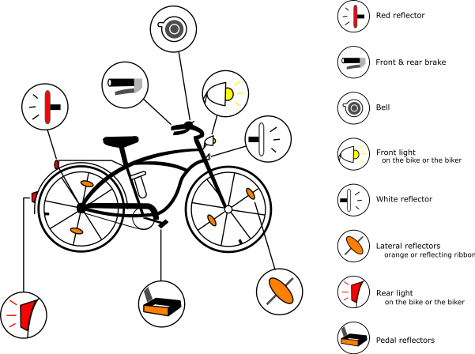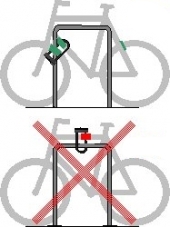- Daily & Weekly newsletters
- Buy & download The Bulletin
- Comment on our articles
Urban biking: Brussels edition
On your bike, get set, pedal!
Tired of sitting in a cramped car or tram as you watch cyclists serenely cruise by? Or perhaps you’ve been reading up on all the reasons why two wheels are better than four? Then it’s time to step out of your Brussels automobile and onto a bike!
Whether your an expat new to the city or simply a Brussels cycling amateur, let The Bulletin be your set of training wheels as you enter the world of urban biking.
On your bike… (Choosing your set of bike wheels)
Before you think about buying a bike, consider some important questions of how you plan to use your new vehicle. Will you use your bike primarily for work or pleasure? Do you plan on combining cycling and public transport? Do you lack space at home or at work to park your bike?
Bike renting: the short-term relationship
As these questions may be difficult to answer straightaway, it might be a good idea to test out the different types of bicycles (such as city, folding, electric and hybrid bikes) through renting. The city of Brussels’ Villo bikes is a good starting point, but offers only one standard type of bike to ride (and a heavy, often malfunctioning one at that). Those looking to test a larger variety of bikes should rather point themselves to a CyCLO or ProVelo station.
Buying a bike: those in it for the up and downhill climbs
For those ready to commit to a long-term bike relationship, many options exist for buying a bike in Brussels that are adapted to your cycling lifestyle. Those planning to use their bike daily and throughout the city, the best option is to buy a second-hand; it is cheaper, encourages city recycling and decreases bike theft chances. While many second-hand bikes can be bought for cheap (€30-€70) in one of Brussels’ flea markets (try Place Jeu de Balle’s daily flea market or the Sunday market at Gare du midi), CyCLO and Petit Riens Bike Paradise also sell a large selection of second-hand bikes at a good price and also guaranteed to be in good working condition.
If you are planning to bike longer distances, buying a brand new bike remains the best option. Decathlon offers a large variety of standardized bikes ranging in quality all while remaining generally cheap in price. Otherwise, bike shops are scattered throughout Brussels offering more specialized (and therefore more expensive) selections.
…Get set… (Equipping you and your bike)
Make sure your bike is in good (and legal) condition
Nothing is more important to your safety than making sure your bike is in top shape before you take on Brussels’ streets by bike (this particularly for second-hand bike users). The surest option is to go in for a bike check-up at one of the above-mentioned bike shops; they will be able to tell you if your bike frame and material is in good quality ornot. If seeing a bike expert is not an option, give your bike a good general inspection (testing the brakes, gears, frame and tyres) and consult this checklist (or see picture below) to make sure your bike is respecting all of Brussels’ traffic rules.

Get a good bike lock
While Brussels may be cyclist deficient, it is certainly not lacking bike thieves. It is therefore of utter important that you secure your bike correctly. Many bike locks exist on the market, but U-lockthe most secure and difficult to cut. There is no need to pay fortune for such a U-lock; a decent one can be bought for €20-€40 at any Brico or Decathlon. Fix the lock around something solid in the ground, and attach your front wheel and bike frame (see picture below provided by Bike Experience).

Get suited up
While you may not be biking the Belgian Ardennes, wearing the proper protection and clothing while cycling throughout the city is not only important, but also life saving.
A helmet and bike lights are your first order of action, and can be bought at Decathlon or any Brussels bike shop. To not waste money on batteries, make sure your bike lights are rechargeable (Decathlon offers a good light set rechargeable by USB cord).
Concerning clothing, reflecting vests and ankle bracelets can be bought in a shop or acquired for free at one of ProVelo’s locations (when available). If this is not an option, consider wearing bright and flashy clothing while on your bike. Also, don’t wait for a Brussels rainy day before getting equipped with some good rain/wind-resistant bike pants and jacket.
Have a good bike map
The key to a safe and pleasant bike ride in Brussels is knowing which streets to take. Start by checking out Brussels Mobility’s interactive bike map indicating all bike-friendly roads and itineraries in Brussels. A print version of this map is downloadable on ProVelo’s website or available for free in any its locations, and includes tips towards a safe bike ride.
…pedal! (Getting to know Brussels by bike)
Don’t make your first bike ‘baby steps’ alone
Instead, get beginner’s training and coaching for free with Bike Experience. Every Spring, this organization helps encourage Brussels residents to commute by bike by offering a special week-long training (this year from 5 to 16 May 2014) as well as a Coach for their first three days commuting.
Guided bike tours and trails
Once you feel comfortable on your bike, consider following one of ProVelo’s bike tours (organised every weekend from late Spring to early Fall or by request). These free tours explore everything from Brussels’ architecture and nature to its breweries. Those looking for an extended bike ride should try the 60km Green Trail put together by Brussels’ Environmental Association. Good for hikers and cyclists, this green belt is comprised of 7 sections that allow you to discover Brussels’ different landscapes.
Repairs
Regular bike use should be accompanied with equally regular bike maintenance. Perform regular check-ups of your bike’s brakes, tyres and gears. For small bike repairs, CyCLO, ProVelo and Petit Riens Bike Paradise all house experienced bike mechanics performing repairs daily for almost nothing (their websites also propose another bike workshops in Brussels). These organisations, as well as the Atelier Vélo Papa Douala, also offer bike repair workshops that teach you how to make your own basic bike repairs. Use this knowledge then to benefit from Papa Douala’s three public bike repair stations placed throughout St Gilles.
Photo courtesy of Flickr/William Murphy


















